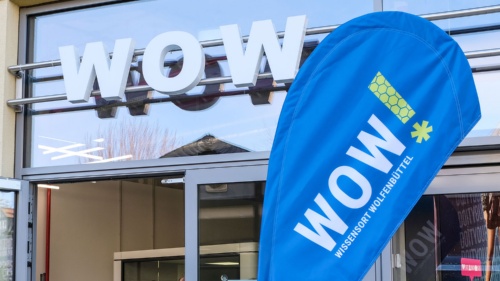 The WOW! in the Löwentor.
The WOW! in the Löwentor.
The WOW regularly offers a varied and interesting programme for everyone. Information evenings, network meetings, workshops and exhibitions on four subject areas are designed to take knowledge transfer to a new level. The topics are "Energy, water, climate protection and new mobility", "Digitalisation, AI and new media", "Innovative manufacturing and new working environments" and "Social change and health, participation and culture".
"In discussions, we also want to address the digital transformation or the challenges of heat planning and give researchers, but also students, the opportunity to enter into a dialogue with various relevant groups, institutions and companies on research questions, design and research results," Lukanic looks ahead, "don´t hesitate to involve yourself here to show what you can do, what you stand for and to talk about your contribution and your ideas on the topics." Because: "We need to talk and publicise the issues and also ensure understanding for the things we do. It's not getting any easier, many things are getting more complicated and many people don't feel involved because there is a lack of understanding for transformation in many places."
Of course, Ostfalia University is also on board in a place like this. President Professor Dr Rosemarie Karger: "I am proud and happy that we can now really say that we are getting started. Together with various stakeholders in the region, knowledge is being collated, innovations discovered and new findings gathered time and time again. Together with the city of Wolfenbüttel, we want to make all of this visible and bring it to the outside world. I think this is a really big and good goal that we have set ourselves." It will be particularly exciting for the citizens of the region because, as the President reports, they will be able to find out about current research topics and projects from the Wolfenbüttel area and exchange ideas directly with the various stakeholders. "And that is particularly important for us as a university," she emphasises.
Coffee is the future - and the path to digitality?
The first lecture at WOW! was given by futurologist Max Thinius. "What I can tell you about the future, very briefly summarised, could also be done with this cup here. Coffee is actually the most important thing we need for the future. I mean, imagine you come to this wonderful venue and there is no AI. Then you think that's unfortunate. Now imagine you come to this venue and there's no coffee. That's when you realise what the future is really about. But most people think the future means lots of new technology, eating insects and AI taking over my job."
However, the last assumption in particular is a misconception in his eyes. The fact that AI will take over the job "is not true at all, by the way, because AI is worth relatively little without humans," he emphasises, "AI can automate, but only by a factor of two to five. However, if we use AI together with humans, then we have a factor of 250 to 3000, which means that it can generate much, much more productivity if we bring AI together with humans." According to him, this also means that the future doesn't just happen, we shape it.
"We actually have over 70 percent of the opportunity to shape the future in the place where we live and with the people who are there, and that applies more to digitality than to industrialisation. In industrialisation, we had really big processes that were difficult to initiate. In digitalisation, i.e. technology plus reality, we now have more and more smaller processes that are intelligently networked with each other. Above all, they can be created anywhere," says futurologist Max Thinius. For example, no one has to move to Berlin anymore to have all the opportunities for progress that we thought we had during industrialisation, but digitality can be accessed anywhere.
And in his opinion, there is also another piece of good news: "You can set up a digital structure and leave the analogue one exactly the same. In other words, you can optimise the digital side without having to give up the analogue side. We can accept and integrate digital structures into our society without having to give up the industrialised world immediately. And that's new. In the past, when we switched from one industrial technology to another, it was a problem. Then it wasn't so easy. We had to switch off one and switch on the other because the two didn't work together. That has now become easier in the digital world. And this relationship is something very, very specific for everything we can do in the future. We can do anything under the principle, yes. We just have to combine the digital with reality. Industrialisation was probabilities, digitalisation is possibilities."
Press release of the city of Wolfenbüttel, 04.03.2024
Image: City of Wolfenbüttel